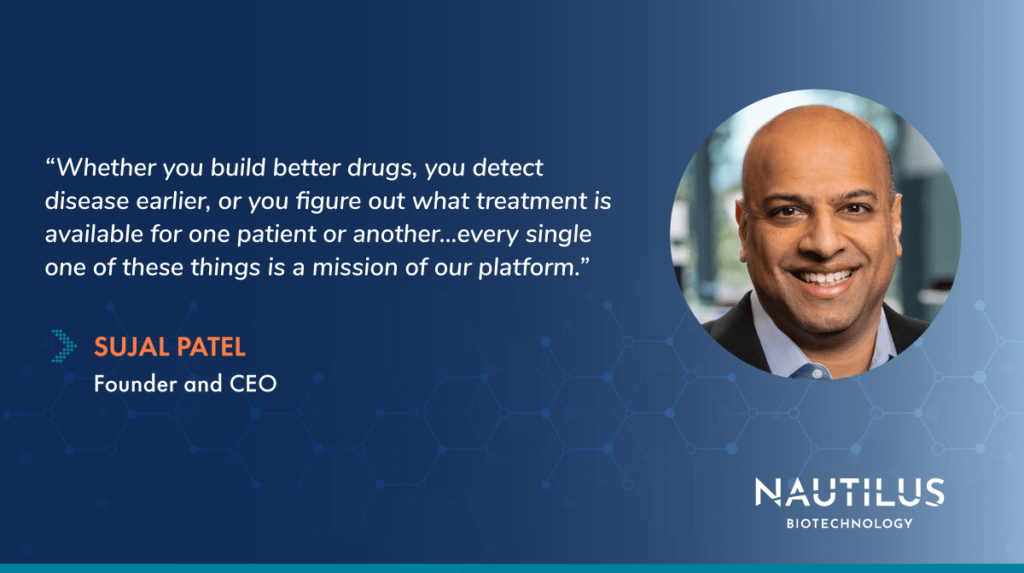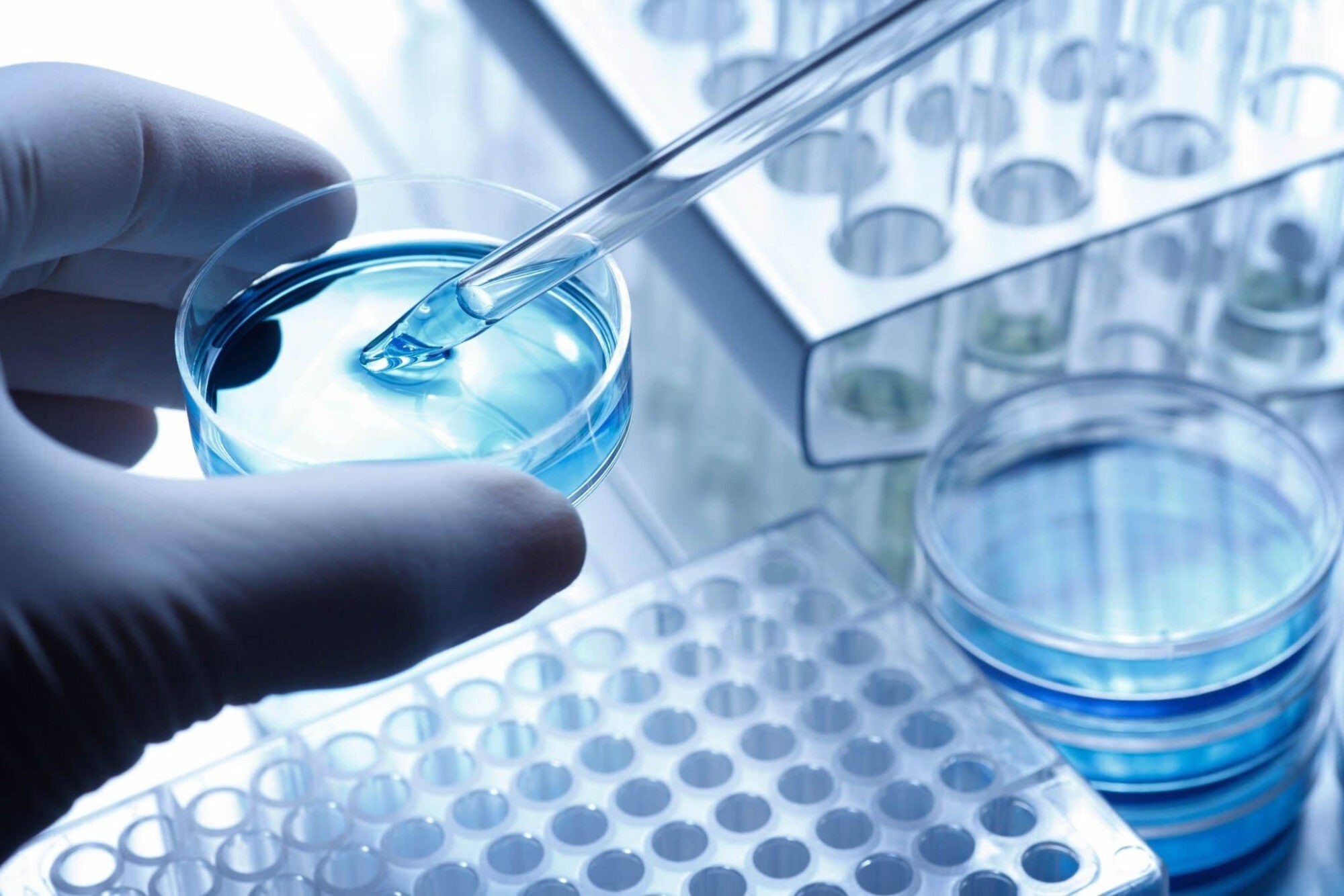
Why we founded a company to improve proteomic analysis for everyone

Chris Blessington
November 15, 2022
Nautilus Biotechnology cofounders Parag Mallick and Sujal Patel had both practical and visionary aspirations for designing a revolutionary proteomics analysis platform.
They shared a desire to create a proteomic analysis platform that would accelerate the efficient development of novel therapeutics and diagnostics, but the two founders focused on different aspects of this ultimate goal.
In this blog post we cover how Parag and Sujal’s complimentary motivations drive Nautilus in a way designed to enable developments in proteomics that can truly change the world.
Practical motivations – the need for higher sensitivity, throughput, and ease-of-use in proteomics technologies
The proteome is the complete set and abundances of proteins in a biological sample. Proteins drive most biological processes at the molecular level. Ccomprehensively measuring and analyzing the proteome with novel proteomic analysis technologies will provide a more fundamental understanding of these processes and how we can alter them to design new precision medicines and more.
In the years leading up to Nautilus’ founding, co-founder and Chief Scientist Parag Mallick, was excited by the potential of proteomics, but found current proteomics technologies like affinity probes and mass spectrometry lacking. There are three main reasons for this:
- Low proteome coverage – Traditional proteomic analysis technologies can only measure about 30% of the human proteome. This isn’t enough to make meaningful, proteome-wide comparisons. Such low coverage made it nearly impossible to confidently say what proteins were responsible for phenotypic differences between samples.
- Low throughput – Large sample sizes are necessary to confidently associate proteome profiles with particular biological functions, but no traditional proteomic analysis technologies could handle such large sample sizes in a reasonable time frame at a reasonable cost.
- Low ease-of-use – From sample preparation to data analysis, many proteomics technologies are difficult to use. It can take months for an experienced scientist to learn the necessary techniques for making relatively simple measurements. Research could be greatly accelerated if proteomics technologies were simply easier to use and their results easy to interpret.
After identifying these practical problems, Parag came up with the conceptual framework for the Nautilus Proteome Analysis Platform (which we’ll describe in more detail below) and found an excellent collaborator in Sujal Patel who was inspired by the world-changing applications of proteomics.
Visionary motivations – applications that vastly improve healthcare
While Parag was focused on these practical motivations for improving proteomic analysis technologies, Nautilus co-founder and CEO Sujal Patel was perhaps more motivated by the Nautilus platform’s potential to fundamentally change healthcare. As Sujal mentioned in a recent interview:

Applications of proteomic analysis
Indeed, next generation proteomic analysis technologies like the Nautilus platform have the potential to improve medicine across the continuum of care including:
- Enhanced drug development – With a better understanding of the differences between the human proteome in health and disease, researchers can create drugs that target diseases at their root causes in dysfunctional proteins. Using next generation proteomics technologies, researchers could also create drugs that affect diseased cells and not healthy ones. This should lead to fewer side effects and the development of more drugs that ultimately succeed in clinical trials.
- Better diagnostics – More effective and accessible proteomic analysis platforms will enable physicians to pinpoint the molecular basis of a patient’s ailment. Physicians may also see patients’ proteomes change before symptoms manifest and will be able to prescribe treatments that effectively treat ailments at their root causes earlier.
- Personalized medicine – Having access to proteomics data should enable physicians to prescribe treatments that are more likely to work for their individual patients. For example, if there are two drugs available to treat a disease, but one has toxic interactions with a particular set of proteins, physicians could avoid prescribing this drug to patients whose proteomes show elevated levels of these proteins.
These proteomics applications should not only make medicine more effective, but should also decrease healthcare costs by leading to fewer failed clinical trials, more appropriate treatments, and fewer side effects.
Healthcare is just the tip of the iceberg in terms of the applications of proteomics. You can read more about the potentially world-changing applications of proteomics in Parag Mallick’s recent blog post for the UN.
Accelerating proteomics and revolutionizing healthcare with the Nautilus platform
These possibilities motivated the founding of Nautilus, but how exactly will Nautilus achieve them?
The Nautilus platform is designed to quantify the proteome using single molecule analysis and machine learning. It leverages hyper-dense single-molecule arrays similar to the ever-improving microchips in your computer. These contain billions of “landing pads” that isolate single proteins (one protein per pad). To identify the proteins on each pad, we repeatedly flow multi-affinity probes over the array and these selectively bind to short motifs found in a fraction of the proteins. We monitor binding across the entire array and use machine learning algorithms to determine protein identity from the binding patterns occurring at each pad.
The simultaneous, repeated analysis of billions of protein molecules is expected to provide us with unprecedented sensitivity and dynamic range. By tallying up the proteins identified at each landing pad, we aim to build a full picture of the proteome from data collected at the scale of single protein molecules and deliver users a comprehensive list of proteins and their abundances. In addition, our platform queries full-length proteins and is compatible with affinity reagents that detect amino acid modifications known as proteoforms. Ultimately, we believe the Nautilus Proteome Analysis Platform will accurately identify and quantify 95% of the human proteome.
The Nautilus Proteome Analysis Platform is designed to solve the practical problems in proteomics and enable researchers to achieve truly inspiring applications!
Check out the Translating Proteomics podcast to learn more about why we’re poised for a proteomics revolution
MORE ARTICLES
